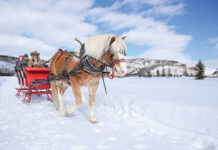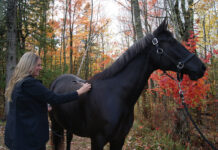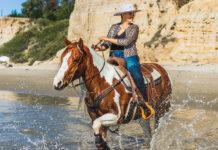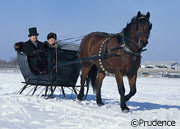For some, a foray into the horse industry involves starting a company from the ground floor. Two women have done this, literally, by developing riding boots that have revolutionized equestrian footwear. Elizabeth Cross and Pamela Parker, co-founders of Ariat International Inc., located in the San Francisco Bay area, have made their company’s name synonymous with quality and technology.
“We both have horses in our backgrounds,” says Cross. “Pam has been riding since she was 10 and currently keeps her horse locally on the Peninsula. I grew up on a Thoroughbred farm in Pennsylvania, where my father raised racehorses. Plus, I did all the 4-H stuff, so we both have a real love and familiarity with horses.”
Parker and Cross met while studying for their MBAs at Stanford’s Business School. After graduation, they joined a large strategy analysis firm working on Reebok athletic shoes. While analyzing different markets for athletic footwear, they informed their client of a category of interest: equestrian footwear.
Reebok was overloaded with new niche markets, so Parker and Cross were able to take the idea and run with it. “We left the firm and did two things: started developing product with engineers and designers from the athletic shoe business, and writing our business plan,” says Cross.
Through careful management of the product manufacturing overseas, the strategic marketing domestically, and the advertising campaign nationally, the company began shipping product in December 1992. It took off like a shot, and Ariat has since turned equestrian footwear around.
“We want to be known as the company that designs boots for athletic performance,” Parker says. “Most athletic shoe companies don’t believe that riding is a sport, and most boot manufacturers choose to think that riding is a lifestyle. But we feel that it is quite a demanding sport, and what we manufacture is athletic equipment that enhances your ride.”
Their line has expanded to include men’s and winter footwear, a half-chap/boot riding system, and most recently, a tall field boot. The company has grown in size as well. The majority of employees at Ariat are women, and a good deal of them are riders. “We have the great fortune to have access to incredibly committed, motivated and productive employees,” says Cross. “Because we sell to a customer base of enthusiasts and hobbyists, we also hire people like that. It really helps us create great stuff. People are able to work in their position, be it marketing or finance or product development, and they also get to work in the industry they love, which is horses.”
Parker reminds people interested in working in an equestrian profession not to overlook a solid horse-industry company. “So often, it happens that people who are really passionate about horses think that the only opportunities are in training or instructing,” she says. Equestrians should try to think about a career differently, and become affiliated with a horse organization or company.
“Working for a horse company is not just a job,” she adds. “Employees here truly believe that they’re doing work that is changing the industry.”
Ariat has seen success reflected in many ways. Cross says, “The biggest reward, first, is building a great environment and a great culture. The second thing is making great product, and really revolutionizing equestrian footwear, so that equestrians can come to us for the latest in technology. Having a leadership role like that is incredibly exciting. Those two things, the product and our team, are highly rewarding, and I don’t know which would be more important.”
Read about other unique equestrian careers.






Great story. Hopefully I can do something like that someday.
This is an excellent take on how to think about a ‘horse related’ job–especially the advice to think about a position i.e. marketing, finance, product development,whatever–and then relate it back to the horse industry. I heard one FEI 2010 interview where the horse person had an MBA in International Commerce and Diplomacy and was now using that background extensively in her current ‘horse related’ job. We horse people have got to learn how to think outside of the ‘box stall’ more. Good work.